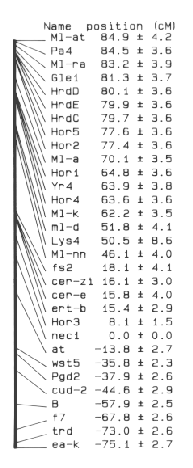

Based on a study of powdery mildew resistances derived from Hordeum spontaneum Jahoor & Fischbeck (1987) named six new resistance genes in or closely linked to the M1-a locus as M1-a16 to M-a21. Futhermore, they named another M1 gene not belonging to the M1-a locus as M1-i. They concluded that this locus was also located on chromosome 5 based on segregation data with powdery mildew locus M1-p and with white stripe locus wst5. However, the recombination percentage reported will not be considered in the present map estimate of chromosome 5 because M1-p is probably not located on chromosome 5 (see Jensen, 1985) and because it is impossible to get sensible recombination estimates based on the powdery mildew scoring used (see Jahoor, 1987).
Ladogina et al. (1987) report two new loci, Glu-A and GluB, controlling two glutelin fractions detected in polyacrylamide gel electrophoresis. In a cross involving the translocation T1-5a they found that the two loci were closely linked and that they were linked with Pgd2 and Hor3 on chromosome 5. It was concluded that the loci were located on chromosome 5. The degree of linkage with the translocation T1-5a was not reported. However, the linkage with the translocation may affect the linkage between the loci and, furthermore, due to linkage with the translocation the reported linkage estimates could also be obtained, if the Glu loci were located on chromosome 1. Therefore, the recombination estimates were not considered in the estimation of the map of chromosome 5.
Shewry & Parmar (1987) studied the relationship of the gene product of the HrdF (hordein) locus, originally defined in starch gel electrophoresis after extracting the hordein without reducing agent, with that of Hor2. They proposed HrdF renamed to Hor5. This new name has been used in the map of chromosome 5 shown in Fig. 1.
The HrdG (hordein) locus was proposed renamed Hor4 by Shewry et al. (1987, 1988). They studied linkage with this locus and loci Hor1 and Hor2. They reported the following recombination percentages: Hor2×Hor4 14.18+2.22, 20.25+2.22, 24.82+3.14, respectively in crosses 1, 2, and 3. Hor1×Hor2 19.08+1.58 and 22.96+2.25 in crosses 2 and 3, and Hor1×Hor4 1.81+0.67 and 3.62+1.22 in crosses 2 and 3. Only the three recombination percentages underlined fit into the linkage map using the procedure described by Jensen & Jørgensen (1975). The linkage map of chromosome 5 is shown in Fig. 1. The difference between this map and the map reported last year is negligible.

References
Jahoor, A. 1987. Mehltauresistenz israelicher Wildgersten-Resistenzspektrum, Vererbung und Lokalisierung. Diss. Fak. Landw. u. Gartenb., TU München.
Jahoor, A. and G. Fischbeck. 1987. Genetical studies of resistance of powdery mildew in barley lines derived from Hordeum spontaneum collected from Israel. Plant Breeding 99, 265-273.
Jensen, J. 1985. Coordinator's report. Chromosome 5. Barley Genetics Newsletter 15, 74-77.
Jensen, J. and J. H. Jørgensen. 1975. The barley chromosome 5 linkage map. I. Literature survey and map estimation procedure. Hereditas 80, 5-16.
Landogina, M. P., V. P. Netsvetaev, A. A. Pomortsev, A. N. Ovchinnikov and A. A. Sozinov. 1987. Two new glutelin-coding loci GluA and GluB on chromosome 5 of barley. Barley Genetics Newsletter 17, 28-31.
Shewry, P. R., and S. Parmar. 1987. The HrdF (Hor5) locus y-type hordeins. Barley Genetics Newsletter 17, 32-34.
Shewry, P. R., S. Parmar, R. P. White, and J. Franklin. 1987. Mapping and biochemical analysis of the Hor4 (HrdG) locus encoding B hordein-like polypeptides. Barley Gentics Newsletter 17, 87-89.